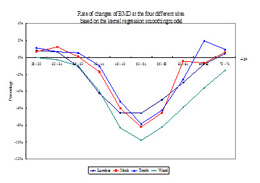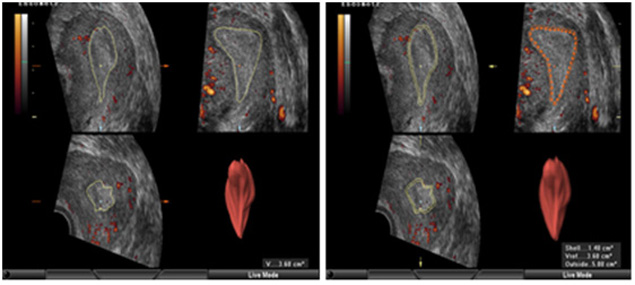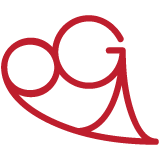Research Team
The Reproductive Medicine Division is recognised by both the Royal College of Obstetricians and Gynaecologists and Hong Kong College of Obstetricians and Gynaecologists for subspecialty training in Reproductive Medicine. It provides a tertiary referral service in reproductive medicine in Hong Kong. The Division is actively collaborating with a number of centres in Mainland China and other countries on various aspects of reproductive medicine. There are 10 PhDs within the division to provide support for basic scientific research.

Longitudinal studies were carried out in a cohort of about 500 women showing the prevalence of menopausal symptoms changed with time.

Endometrial and subendometrial blood flow determined by three-dimensional power Doppler ultrasound and shell technique
Reproductive Medicine
Staff
- Prof. Ernest H.Y. NG
- Prof. William S.B. YEUNG
- Prof. K. LIU
- Dr. Raymond H.W. LI
- Dr. Calvin K.F. LEE
- Dr. Philip C.N. CHIU
- Dr. Cherie Y.L. LEE
- Dr. W. LIU
- Dr. Rachel W.S. CHAN
- Dr. Keith C.L. LEE
- Dr. Kevin K.W. LAM
- Dr. T. LIU
- Dr. M. LI
Fertility Regulation
- Effects of ovarian stimulation on endometrial receptivity
- Psycho-social aspects of assisted reproduction
- Menopausal studies
- A double-blind randomized placebo-controlled clinical trial on the effects of Chinese medicine formula (Erxian Decoction) on menopausal symptoms has been started to further study the role of CM in menopause.
- A study on "Fracture incidence reduction and safety of TSE-424 (Bazedoxifene Acetate) compared to Placebo and Raloxifene in Osteoporotic Postmenopausal Women" is ongoing. Genetic study on menopause in Chinese women is also being planned.
- Genetic and lifestyle factors associated with age at menarche in Hong Kong Chinese Females Interaction of sperms and embryos with the female reproductive tract.
-
Glycodelin and reproduction
We focus on the role of glycodelin on human reproduction and to understand how glycodelin affect male fertility, as well as the glycosylation pattern in related to human disease.
-
MicroRNA in reproduction
MicroRNAs are small non-coding RNAs. They do not code for proteins but suppress their production. They are important in a number of developmental processes. Recently, microRNAs have been reported to be involved in reproduction. We have also data showing that they are important for early embryo development and implantation.
-
Endometrial receptivity
Human endometria are receptive during a short period of time after LH surge. This process is regulated by steroid hormone on differential gene and protein expression in the endometrial cells. By using in vitro, in vivo, transgenic mice and human samples, we aim to delineate the underlying molecular, biological and biochemical changes associated with endometrial receptivity. This will help to provide better regimen on treating infertility problem in human.
-
Endometrial Stem Cells
We are now continuing with the characterisation endometrial stem cells and its involvement in the development of the gynaecologic disease - endometriosis. Current studies focus on the role of stem cells in human and mouse endometrium.
- A representative culture dish displaying the distribution of endometriotic colonies and variation of colony size after 21 days of culture.
- A typical small colony of endometriotic stromal cells
- A typical large colony
-
Anti-Mullerian Hormone in Reproductive Medicine
Effect of hormonal contraceptives on serum AMH level: our study demonstrated that serum AMH concentration is not influenced by the use of exogenous hormones.
Serum AMH level in women with secondary amenorrhoea: our study suggested that AMH serves as a useful diagnostic tool in differentiating the different causes of secondary oligo-amenorrhoea with very good diagnostic accuracy. Serum AMH concentration is significantly increased by 2 to 3 times in women having WHO group 2 anovulation including polycystic ovary syndrome (PCOS), and is significantly reduced to very low levels in premature ovarian failure (POF), while remaining unchanged in hypogonadotrophic hypogonadism and hyperprolactinaemia compared to ovulatory women.
The significance of serum AMH level in controlled ovarian stimulation and intrauterine insemination: our study showed that higher serum AMH level was associated with significantly higher cumulative live birth rate, and serum AMH level has a modest predictive value on ovarian hyper-response.
The significance of serum AMH level in in-vitro fertilisation: We are working on the role of serum AMH in predicting cumulative live birth rates in patients undergoing IVF. We are also planning for clinical trials on the utilisation of serum AMH level in determination of the optimal ovarian stimulation regimen.
Serum AMH in pregnancy: We carried out a retrospective analysis on the role of maternal serum anti-Mullerian hormone level in predicting Down's syndrome pregnancies. There was no significant difference in maternal serum AMH level between pregnancies affected and unaffected by foetal Down syndrome. However, we incidentally found that our first trimester serum samples had higher AMH concentration compared to second trimester samples. We will further investigate the longitudinal change of serum AMH level throughout pregnancy, which may hopefully give some insight on its physiological role and clinical utility during the antenatal period.
AMH in polycystic ovary syndrome (PCOS): we have performed some preliminary work on the correlation between insulin resistance, obesity, hyperandrogenaemia and serum AMH in women with PCOS.
-
Adrenomedullin in oviductal physiology and pathophysiology
We are collaborating with the Departments of Anatomy and Physiology in studying the role of adrenomedullin in ciliary beat and muscular contractility of human oviduct, and its possible pathophysiological role in tubal ectopic pregnancy.
-
Studies of germ cell development
We are interested in studying molecular mechanisms regulating germ cell development and meiotic cell cycle. For this purpose, we use various genetically modified mouse models to observe possible defects in germ cell development for understanding the underlining mechanisms.
Research opportunities for Master of Philosophy and Doctor of Philosophy are open in the following areas of studies:
- Gamete-Reproductive Tract interaction: Genomic, Transcriptomic and Proteomic approaches (Prof WSB Yeung, Dr CKF Lee, Dr PCN Chiu)
- Glycomic studies on Glycodelin functions and Zona pellucida binding (Prof WSB Yeung, Dr PCN Chiu, Dr CL Lee)
- Endometrial Receptivity (Prof EHY Ng, Dr CKF Lee, Dr CYL Lee)
- MircoRNA on embryo implantation and cancer development (Prof WSB Yeung, Dr WM Liu)
- Ectopic pregnancy: Role of Adrenomedullin and Olfactomedin (Dr RH Li, Dr CKF Lee, Dr PCN Chiu)
- Stem cell differentiation and Endometrial stem cell nich (Prof WSB Yeung, Dr CYL Lee, Dr RW Chan)
- Spermatogenesis regulation using transgenic/knockout mouse models (Prof K Liu, Dr CKF Lee)
Any research highlight, press conference, significant output/contribution or awarded grants would be uploaded to our new webpage at http://www.obsgyn.hku.hk.




